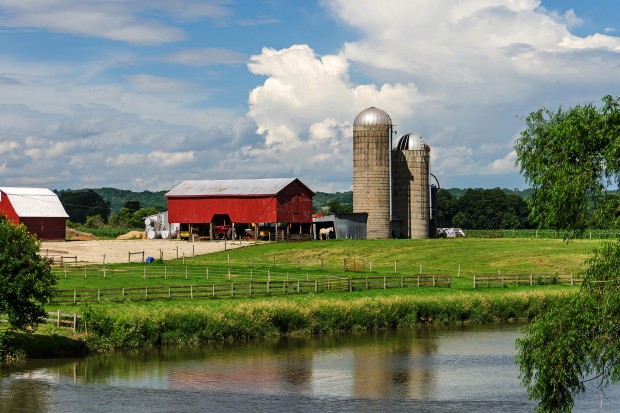
Oklahoma Attacks EPA as Federal Agency Finalizes ‘Waters of the U.S’ Rule
-
Logan Layden

Logan Layden / StateImpact Oklahoma
Oklahoma farmer Mason Bolay worries the streambeds and ponds on his family's land will now be regulated by the federal government.
The U.S. Environmental Protection Agency’s Waters of the United States Rule — also known as the Clean Water Rule — attempts to clarify which bodies of water qualify for federal protection — which ones are streams, which ones are tributaries, whether pollution dumped into one stream will trickle into another — that sort of thing.
But what the EPA says is nothing more than a tweak to current rules that farmers won’t event notice, opponents say is a vast federal government overreach that will extend to every pond and ditch in the country.
Despite attempts by Congressional Republicans and some rural Democrats to derail the effort, the EPA on Wednesday finalized the WOTUS rule, as Politico‘s Jenny Hopkinson reports:
The agencies and their supporters say the rule is needed to prevent pollution and protect drinking water sources, which are under threat because of weak state and local regulations and a lack of enforcement. The rule is meant to make it clearer which waterways the EPA and the corps can oversee under the Clean Water Act, enacted in 1972, which covers “navigable waters” such as the Mississippi River and Lake Erie, but is vague on how far upstream protections must go to keep those water bodies clean. It would establish whether antipollution laws are triggered if a farmer blocks a stream to make a pond for livestock, a developer fills in part of a wetland to put up a house, or an oil pipeline has to cross a creek.
As StateImpact has reported, Oklahoma Attorney General Scott Pruitt is likely to sue over the rule, and already, the state’s push-back is underway. Oklahoma Water Resources Board Executive Director J.D. Strong released a statement calling the WOTUS “difficult, if not impossible, to implement,” because of a lack of coordination between the federal and state government.
“If the final rule and its forthcoming implementation don’t make the already fuzzy line of federal jurisdiction more clear, then we can expect an onslaught of litigation and confusion that does nothing to protect our waters,” Strong says.
Oklahoma Republican U.S. Senator Jim Inhofe — famous for his battles with the EPA — is also weighing in. From The Huffington Post:
Sen. Jim Inhofe (R-Okla.), chair of the Senate’s Environment And Public Works Committee, criticized how sweeping the rule is.
“Despite their assurances, it appears that EPA and the U.S. Army Corps of Engineers have failed to keep their promises to Congress and the American people,” he said. “In fact, instead of fixing the overreach in the proposed rule, remarkably, EPA has made it even broader.”
But EPA Administrator Gina McCarthy’s argument in favor of WOTUS is simple:
“For the water in the rivers and lakes in our communities that flow to our drinking water to be clean, the streams and wetlands that feed them need to be clean too,” McCarthy says in a statement.
